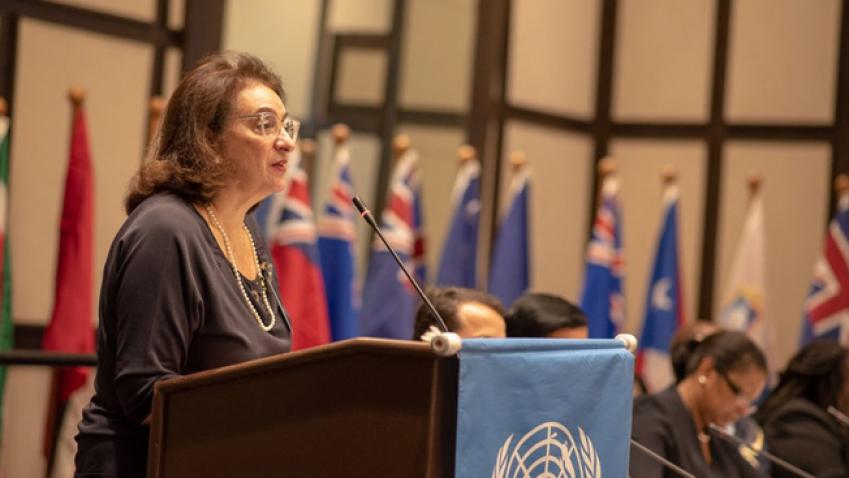Speaking to over 20 Caribbean countries gathered in Port of Spain, Trinidad and Tobago, UN Assistant Secretary-General Maria Francesca Spatolisano said that stronger public sector and enhanced institutions are necessary for small island states in the region to achieve their development goals.
“There is no one blueprint to implement the 2030 Agenda, yet it is clear that the Sustainable Development Goals (SDGs) require strong institutions, transparency and inclusion,” she said before warning against ignoring the specific challenges of the Small Island Developing States (SIDS). “We need to make sure that SIDS issues are not crowded out,” she urged.
Facing specific challenges to development, posed by their small size, geographical isolation, vulnerability to natural disasters and climate change, the Caribbean Small Island Developing States (SIDS) are looking for comprehensive solutions towards achieving sustainable development. The meeting in Port of Spain on “Holistic approaches for the implementation of Agenda 2030 in the Caribbean Region” was an opportunity to discuss such frameworks.
The meeting laid bare the numerous obstacles to the development of Caribbean SIDS. For example, representatives of Aruba and other participants highlighted that Government ministries still tend to work in silos and greater efforts are needed to promote policy and operational coherence underpinned by whole-of-government and whole-of-society approaches.
Participants highlighted that the SIDS Accelerated Modalities of Action (SAMOA Pathway) represents the political and strategic blueprint for the sustainable development of SIDS, but it is the SDGs that represent the operational mechanism for their development.
They also emphasized the need for a holistic approach, involving opposition political parties to ensure buy-in and the institutionalization of approaches for engagement and inter-ministerial collaboration to ensure continuity of processes. Integration of civil society and the private sector in national dialogues was mentioned by many participants as a critical element for raising ownership and awareness of the SDGs, along with a more engaging process.
Several countries stressed the importance of finding new innovative financing instruments that would best suit a country’s policy environment. The need to build statistical capacities and bridging the data gap was also highlighted by a number of countries.
The conference also touched on the topic of the upcoming High-level Political Forum on Sustainable Development (HLPF). Ms. Spatolisano encouraged all countries to conduct Voluntary National Reviews (VNRs) of SDG progress, stressing that these reviews can help to identify opportunities, challenges and solutions. Nikhil Seth, Assistant Secretary-General at the United Nations Institute for Training and Research (UNITAR) added that the process of conducting a VNR is more important than the reporting itself.
Ms. Spatolisano encouraged the participants to accelerate efforts to achieve the SDGs, noting the urgency of the task. “The year 2030 is just around the corner– not one day should be wasted, not one person should be left behind,” she said.
For more information on the programme of the conference:
http://workspace.unpan.org/sites/Internet/Documents/UNPAN99252.pdf
Photo courtesy of UN ECLAC.
About UN DESA
UN DESA Products
UN DESA Divisions
- Office of Intergovernmental Support and Coordination for Sustainable Development
- Division for Sustainable Development Goals
- Population Division
- Division for Public Institutions and Digital Government
- Financing for Sustainable Development Office
- Division for Inclusive Social Development
- Statistics Division
- Economic Analysis and Policy Division
- United Nations Forum on Forests
- Capacity Development Programme Management Office

